Kashmir: Is a permanent solution possible within Indian Constitution?
The constitution allows autonomy, the condition on which Kashmir acceded to India, which has eroded over time
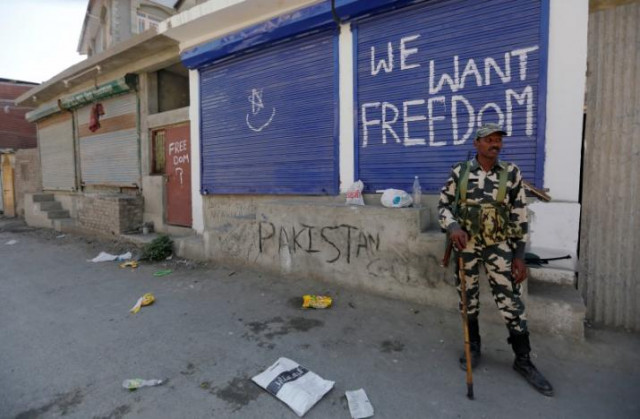
An Indian policeman stands guard near shops painted with graffiti during a curfew in Srinagar, August 5, 2016. PHOTO: REUTERS
Forget Kashmir, let’s talk trade: Indian envoy
Indian Prime Minister Narendra Modi too pitched for dialogue when on August 22 he said “...We need to find a permanent and lasting solution to the problem within the framework of Indian constitution.”
In 1947, with the birth of the Kashmir conflict, India itself raised the issue with the United Nations, which adopted a resolution suggesting a plebiscite. This clearly makes Kashmir an internationally recognised dispute between India and Pakistan, and not India’s internal matter. Moreover, Pakistan controls a large portion of erstwhile Jammu and Kashmir, which makes the country an equal party to the dispute, irrespective of whether or not its control is legal.
The unarmed separatists or pro-freedom leaders of Kashmir refuse a dialogue ‘which has no mandate’ and is in the confines of the Indian constitution. Experts say no permanent solution is possible within the constitutional framework only. “Constitution is not sacrosanct,” says Parvez Imroz, noted human rights advocate in Kashmir. “A Constitution cannot bind every generation and can be amended at anytime.”
The constitution allows autonomy, the condition on which Kashmir acceded to India, which has eroded over time. Imroz says “If they talk about autonomy, how are you sure it will not be diluted again? And how are you going to trust a country which has a history of broken promises?”
G-20 Summit: Modi singles out Pakistan for ‘spreading terror’ in region
National Conference has always dominated electoral politics in Kashmir. It sees internal autonomy as a viable solution. Spokesperson Junaid Azim Mattu says autonomy is not very different from ‘azadi’ or independence. “It is not viable for us to be a standalone country and we believe in sub-nationalism [as a solution], autonomy, our own prime minister, our own president, and where we have all our powers. Only foreign affairs, defence, telecommunication and currency is taken care by India,” says Mattu. About autonomy’s uncertain future, he says, “There are no guarantees in the world.”
However, Mattu says the party is “also open if the people of Kashmir, India and Pakistan can get to agree on some other bigger solution outside the constitution.” Mattu says the party believes in dialogue with all stakeholders, including separatists, but there is an “enormous trust deficit” as far as dialogue is concerned. “New Delhi has abused the institution of dialogue. It has eroded whatever faith people had in the democratic system,” he says. “As far as the question of Indian Constitution is concerned [and] what framework should the talks be in, Delhi will never come to the dialogue table saying that we have admitted defeat,” says Mattu. “It’s a conflict; we have to be pragmatic, innovative and intelligent.”
Sheikh Showkat Hussain, specialist in human rights and international law, and author of four books, says “anything is possible” in the constitution, including autonomy and partial or complete secession. Citing Article 253, Hussain says, “The makers of the constitution and the government of India have kept enough room for secession; they kept a provision under the constitution that once there is a treaty for final disposition of Jammu and Kashmir, for implementation of that treaty, concurrence of the state is essential.”
However, this provision does not apply when finding a solution within the constitution alone. It requires international interference.
Hussain says the Indian government can grant autonomy up to any extent. “The only thing they have to do is revoke the constitution orders,” he says. “That does not even require a parliament session, rather the president has to issue an order to make null and void all the constitution orders passed from 1954 onwards (pertaining to Jammu and Kashmir’s special status).”
G-20 Summit: Modi singles out Pakistan for ‘spreading terror’ in region
About autonomy being a permanent solution, Hussain says it is not viable because India does not control all of the state’s territory. “Kashmir issue is not India’s internal matter because a huge area of Jammu and Kashmir is with Pakistan and we have 37,000 square kilometres, Aksai Chin, with China,” he says. “If you want status quo, it also means secession, because you renounce your claim to those areas, so that again needs an international treaty.”
Indian lawyer, historian and author, AG Noorani, in an article in Frontline magazine, refers to the recent visit of an all-party delegation to Kashmir. This time again, the visit came on the backdrop of conditions put by senior BJP leaders only days back, saying the talks could take place only under the constitutional framework. Noorani writes, “Here, the Hurriyat (separatist) leaders were asked to put on sackcloth and ashes, proclaim acceptance of India’s Constitution and Vajpayee’s triple slogans, and beg for their release to present themselves for an audience with [Home Minister] Rajnath Singh, as his tweet required.”
Noorani writes it would have been ‘political suicide’ had they agreed to meet. “They had publically declared that they would not meet anyone from the parliamentary delegation because their institution, parliament, had just passed a resolution shutting the doors on compromise,” he writes.
Before state Assembly polls in 2014, Mufti-led coalition partner promised to pursue self-rule for the state while its opposite ideologue partner promised to abrogate the already-eroded special status. They later resolved to maintain status-quo in their governance policy.
In an interview on September 10, television journalist Karan Thapar reminded Madhav of his ‘moon’ statement. “My party’s stand is very clear that there is enough freedom and enough laws to help the state,” he said. At another point, he diplomatically said, “People [of any part of the country] have every right to ask for the moon within the framework of the Indian constitution. Whether to give or not to give, the ruling establishment will decide, the government will decide.”
However, it is not that the state government has never asked for restoration of autonomy. The National Conference-led government passed an autonomy resolution with two-third majority in the state assembly in 2000. Mattu says, “It was sent to Delhi and Delhi threw it in a dustbin. We have been trying for a long time for autonomy, at every forum, and it has not been delivered, and we need to be held accountable for that.”
Indian government’s six confidence ‘breaking’ measures in Kashmir
Hussain says irrespective of what separatist leaders demand – mostly right to self-determination – the Indian Government has not even agreed to what democratically elected politicians demand. “Leave aside Hurriyat for a moment, and let them give Farooq Abdullah (National Conference chief), Mehbooba and Sajad Lone (separatist-turned-mainstream politician) what they demanded,” says Hussain.
Noorani says Article 370 has been reduced to an “empty shell” by the 47 Orders “unconstitutionally made” by the president of India for 50 years. “Far from enjoying a preferred status over other states, Kashmir has been put in a position inferior to them,” he writes.
Noorani also writes: “No dialogue can resolve a dispute or deadlock by itself; it might even harden positions. There must be some understanding on a) the participants; b) the issues to be discussed; c) preparatory soundings to ensure that there is some common ground to build on; d) willingness to compromise on both sides; and e) ability of both to carry out the agreement arrived at.”
Vijdan Mohammad Kawoosa is a Kashmir-based journalist and founder/editor of news-website jandknow.com. He tweets @vijdankawoosa


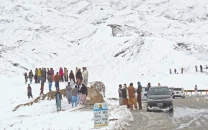

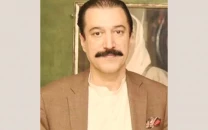
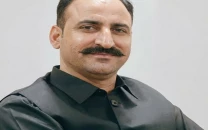
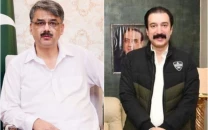












COMMENTS
Comments are moderated and generally will be posted if they are on-topic and not abusive.
For more information, please see our Comments FAQ